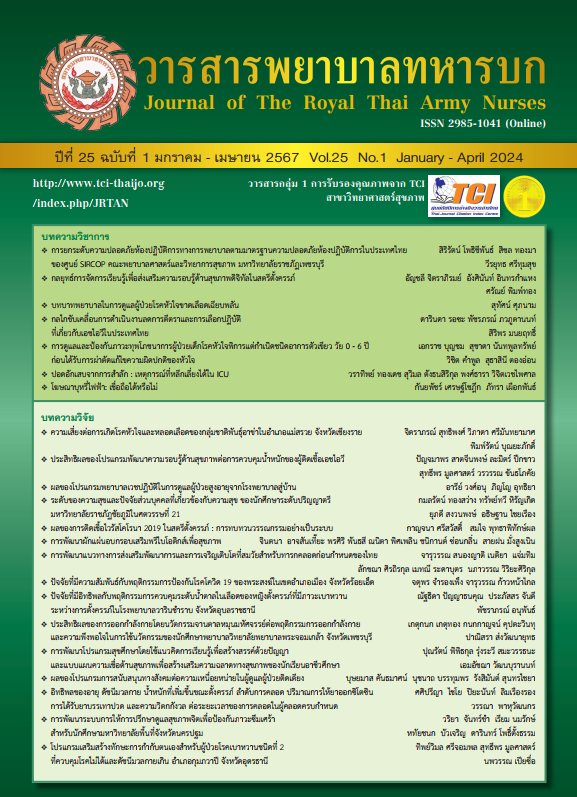The Effects of an Applied Behavioral Activation Therapy Program on the Depressive Symptoms of Older Adults with Depressive Disorder
Keywords:
an applied behavioral activation therapy [BAT] program, depressive symptoms, older adults with depressive disorderAbstract
The purpose of this pre-post tested quasi-experimental research was to determine the effects of an applied behavioral activation therapy [BAT] program on the depressive symptoms. The participants consisted of 68 persons aged 60 years old and older. Then each pair was randomly assigned into the control and experimental group, with 34 persons in each group. The research instruments were the following:
1) the applied behavioral activation therapy program, which was content validated by 3 professional experts, and 2) the depressive symptoms inventory for Thai elderly with depressive disorders, which the reliability using Chronbach’s alpha coefficient was .85. The data were analyzed using descriptive statistics and t-test.
The research results were the following: 1) The after participating in BAT program were significantly lower than their mean scores of depressive symptoms on pretest before participating in BAT program (t = 11.30, p<.001). 2) The mean depressive scores of the experimental group significantly lower than the control group that received standard of care (t= -5.94, p<.001). In conclusion, the BAT program was effectively reduced the depressive symptoms of older adults with depressive disorder. This study suggested that the BAT program should be provided for a long-term follow-up to examine the retention of the program on depressive symptoms. The researcher also considered additional activities of family caregivers to increase the efficiency of the program.
Downloads
References
Lackamp J., Schlachet R., & Sajatovic M. Assessment and management of depressive disorder in older adults. Psychiatria Danubina 2016; 28(1), 95–8.
Whiteford H A., Degenhardt L., Rehm J., Baxter A J., Ferrari A J., Erskine H E., Charlson F J., Norman R E., Flaxman A D., Johns N., Burstein R., Murray C J., & Vos T. Global burden of disease attributable to mental and substance use disorders: findings from the Global Burden of Disease Study 2010. Lancet (England) 2013; 382(9904): 1575–86.
Axinn W G., Ghimire D J., Williams N E., & Scott K M. Associations between the social organization of communities and psychiatric disorders in rural Asia. Social psychiatry and psychiatric epidemiology 2015; 50(10): 1537–45.
Yu D S., & Lee D T. Do medically unexplained somatic symptoms predict depression in older Chinese?. International journal of geriatric psychiatry 2012; 27(2): 119-26.
Bruine de Bruin W., Dombrovski A. Y., Parker A. M., & Szanto K. Late-life depression, suicidal ideation, and attempted suicide: The role of individual differences in maximizing, regret, and negative decision outcomes. Journal of behavioral decision making. 2016; 29(4): 363-71.
Szanton L, Thorpe J., Jr, & Gitlin N. Beat the Blues decreases depression in financially strained older African-American adults. The American journal of geriatric psychiatry. official journal of the American Association for Geriatric Psychiatry. 2014; 22(7): 692–7.
Hershenberg R., Paulson D., Gros D. F., & Acierno R.Does Amount and Type of Activity Matter in Behavioral Activation? A Preliminary Investigation of the Relationship between Pleasant, Functional, and Social Activities and Outcome. Behavioural and cognitive psychotherapy. 2015; 43(4): 396–411.
Alexopoulos G S., Raue P J., Gunning F, Kiosses D N., Kanellopoulos D., Pollari C., Banerjee, S., & Arean, P. A.”Engage” Therapy: Behavioral Activation and Improvement of Late-Life Major Depression. The American journal of geriatric psychiatry: official journal of the American Association for Geriatric Psychiatry. 2016; 24 (4): 320–6.
Janssen N, Huibers MJ, Lucassen P, Voshaar RO, van Marwijk H, Bosmans J, et al. Behavioral activation by mental health nurses for late-life depression in primary care: a randomized controlled trial. Bio Med Central psychiatry. 2017;17(1):1-11.
Solomonov N., Bress J. N., Sirey J A., Gunning F M., Flückiger C., Raue P J., Areán P A., & Alexopoulos G S. Engagement in Socially and Interpersonally Rewarding Activities as a Predictor of Outcome in “Engage” Behavioral Activation Therapy for Late-Life Depression. The American journal of geriatric psychiatry : official journal of the American Association for Geriatric Psychiatry. 2019; 27(6): 571–8.
Chandeawwit V., & Watcharakupt Y. Long-term care insurance system: a system suitable for Thailand. 2017; 22-5. (in Thai)
Lewinsohn P M. A behavioral approach to depression. Essential papers on depression 1975; 150-72.
Polit D F., & Beck C T. Nursing research: Principles and methods. Lippincott Williams & Wilkins. 2004.
Pitisuttitum P. The textbook of Clinical Reseach 4th Edition. 2018. (in Thai)
Soleimani M., Mohammadkhani P., Dolatshahi, B., Alizadeh, H., Overmann, K. A., & Coolidge, L. A Comparative Study of Group Behavioral Activation and Cognitive Therapy in Reducing Subsyndromal Anxiety and Depressive Symptoms. Iranian journal of psychiatry 2015; 10(2): 71–8.
Martell C R., S. Dimidjian and R. Herman-Dunn. Behaviroral Activation for Depression: A Clinician’ s Guide. NewYork: Guilford Press. 2010.
Suktawee S, Soonthronchiaya R., & Jirarode A. The Effect of a Reminiscence Program on The Resilience Among Older Adults with Depression. Journal of The Royal Thai Army Nurses. 2021; 22(1): 235-43. (in Thai)
Sawangvoranard K, Cruthaka C. The Training Development Curriculum Cognitive Skills for The Elderly. Journal of The Royal Thai Army Nurses 2019; 20(1): 207-14. (in Thai)
Wongpanarak N., & Chaleoykitti S. Depression: A Significant Mental Health Problem of Elderly. Journal of The Royal Thai Army Nurses 2017; 15(3): 24-31. (in Thai)
Downloads
Published
How to Cite
Issue
Section
License
Copyright (c) 2024 Journal of The Royal Thai Army Nurses

This work is licensed under a Creative Commons Attribution-NonCommercial-NoDerivatives 4.0 International License.
บทความหรือข้อคิดเห็นใดใดที่ปรากฏในวารสารพยาบาลทหารบกเป็นวรรณกรรมของผู้เขียน ซึ่งบรรณาธิการหรือสมาคมพยาบาลทหารบก ไม่จำเป็นต้องเห็นด้วย
บทความที่ได้รับการตีพิมพ์เป็นลิขสิทธิ์ของวารสารพยาบาลทหารบก
The ideas and opinions expressed in the Journal of The Royal Thai Army Nurses are those of the authors and not necessarily those
of the editor or Royal Thai Army Nurses Association.






